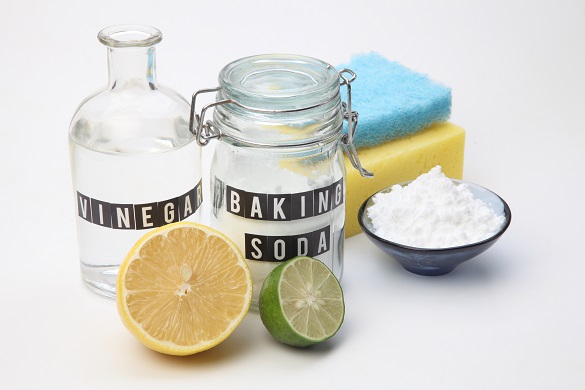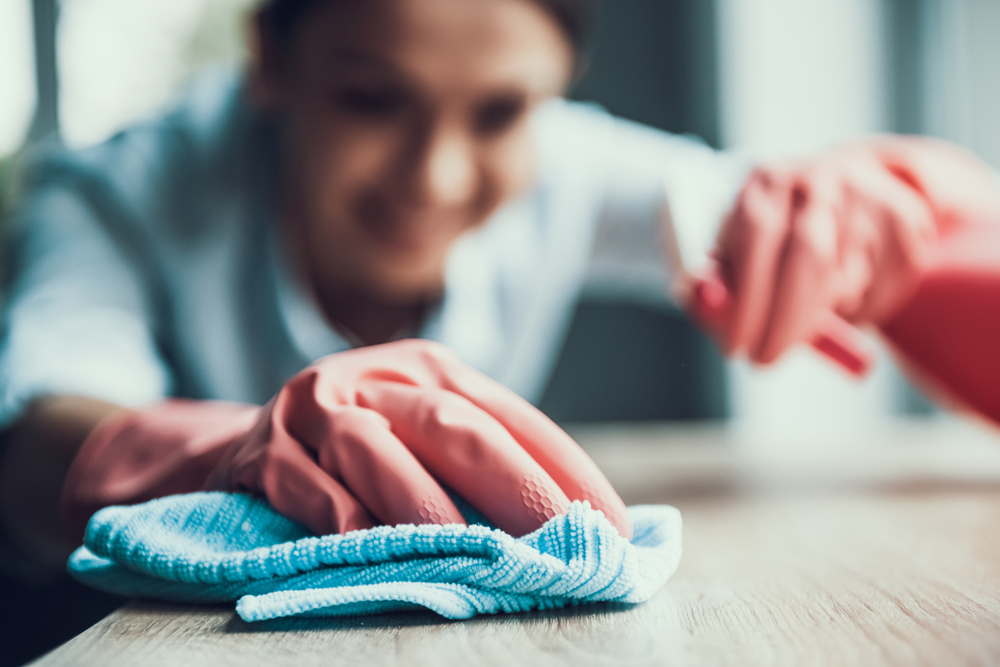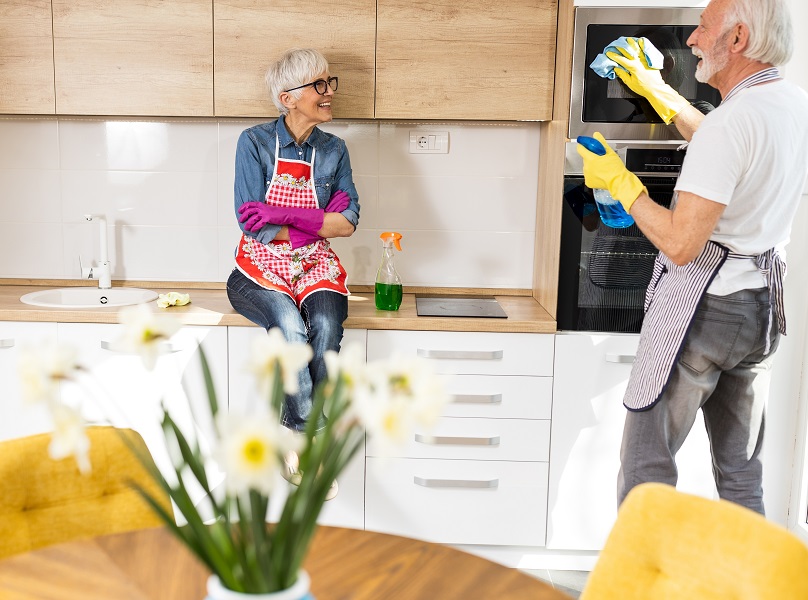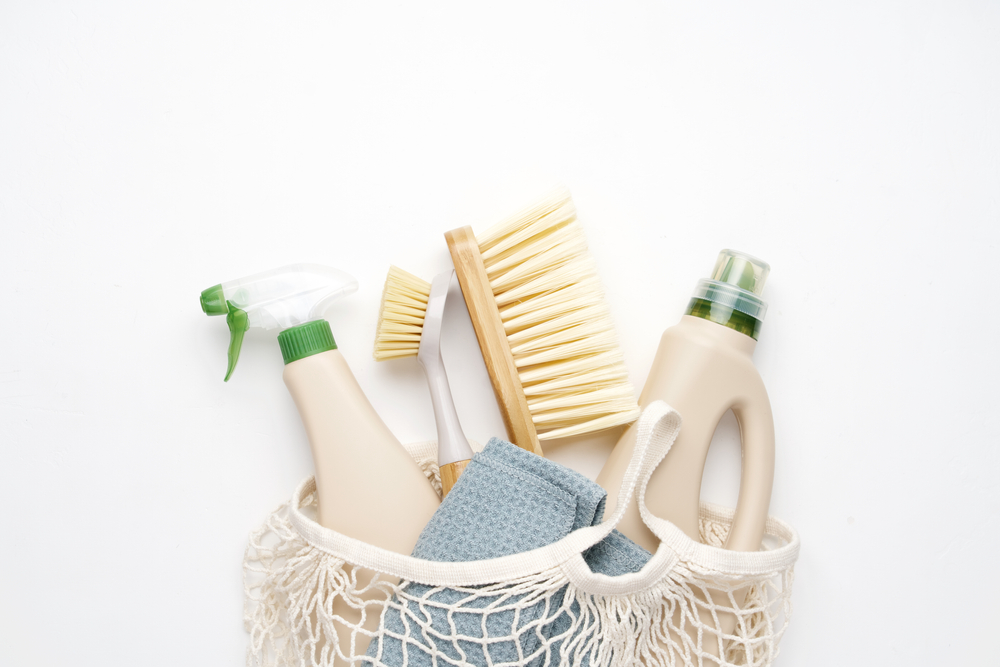Want to waste less, spend less and help the planet? Making your own natural cleaning products is a great start. It’s not hard, either. With a few simple recipes, we’ll show you how to do sustainable cleaning on a budget.
First, we’ll quickly answer the most common questions about eco-friendly cleaning.
Quick answers to your sustainable cleaning questions
What do we mean by ‘natural’ cleaning products?
Natural cleaning products often contain organic ingredients that you might find in the kitchen, rather than a chemical laboratory. The ones you can make at home use non-toxic, plant-based ingredients – like white vinegar or lemon juice.
How do natural ingredients work as cleaning products?

It’s important to know the difference between general cleaning and disinfecting (which means killing germs). The type of natural products you can make at home work well for cleaning, but they’re not powerful disinfectants. You can buy plant-based disinfectants though, which we’ll link to later in this article.
What are the advantages over artificial cleaning products?
Most commercial cleaning products contain chemicals like chlorine, ammonia and sodium hydroxide. These are dangerous to touch, breathe or ingest. What’s more, these products are typically more expensive than natural ingredients – and they come in plastic bottles.
What sorts of cleaning products can you make at home?
It’s easy to make general cleaners for use in the kitchen and bathroom. They’ll help keep your surfaces dirt-free, sparkling and smelling nice. They don’t kill germs as well as stronger chemicals though, so you might want to pair them with a plant-based disinfectant.
Buying eco-friendly cleaning products

If you need something stronger than a general surface cleaner, you’ll probably need to buy it. You can order plant-based disinfectants from companies like Ecover, Ecozone, Delphis and Dettol.
The active ingredients in these cleaners are often citric or lactic acid, plant enzymes or alcohols. Compared with the chemicals in traditional cleaning products, these organic ingredients are more biodegradable and less harmful to living things.
How to make your own cleaning products at home
Key ingredients you’ll need
White vinegar
White distilled vinegar is great for cleaning, because it’s colourless and has a high acidity. It shouldn’t stain your surfaces and is about as powerful as most multipurpose cleaners.
You can safely use vinegar to clean many areas, including:
- Fridges
- Kitchen surfaces
- Microwaves
- Tiles
- Floors
- Shower heads
- Sinks
- Hobs
- Bins

Lemon juice
Like vinegar, lemon is a good cleaning agent because of its acidity. As well as dissolving caked-on dirt, lemon has the benefit of a natural, refreshing scent.
You can use lemons to clean a whole host of things, including:
- Chopping boards
- Fridges
- Microwaves
- Furniture
- Taps
- Ovens
- Floors
- Windows
- Cheese graters
- Kettles
- Toilets
Here are some top lemon cleaning tips.
- Remove fridge odours. Cut a lemon in half and leave it in the fridge for about 30 minutes – that should neutralise any bad smells.
- Polish furniture. Combine two parts olive oil with one part lemon juice, then apply with a microfibre cloth to make wood gleam.
- Get sparkling dishes. Fill a dishwasher-safe container with a cup of lemon juice (or a few lemon wedges), put it on the top rack and run the load as normal for added shine.
- Buff your pots and pans. Sprinkle coarse salt on the cut side of a lemon and rub on copper, aluminium or brass kitchenware, then rinse.
- Clean your oven. Fill an oven-safe baking dish with water and lemon juice, bake for 30 minutes at 250 degrees Celsius, wait for the oven to cool and then wipe away any grime.
Baking soda
Baking soda is an alkali that breaks down oil and grease. Because it’s used in cooking, it’s quite safe and affordable. You can use it as a milder alternative to strong alkalis like bleach or ammonia.
Items and areas you can clean with baking soda include:
- Shower surfaces
- Drains
- Sinks
- Toilets
- Pots and pans
- Ovens
- Tiles
- Carpets
Did you know you can use baking soda and lemon juice to unblock a drain? Here’s how:
- Pour 1/4 of a cup of baking soda down the drain and then 1/2 a cup of lemon juice on top.
- Wait about an hour for the foaming reaction to break down whatever’s clogging the drain, leaving it clear and fresh.
Baking soda is also great at removing smells from carpets and fabrics. Try this:
- Sprinkle the baking soda onto the floor or fabric and leave it for 15 minutes, to absorb the smell.
- Hoover up the baking soda, which will take the smell away with it.
- For maximum freshness, you could add some essential oils to the baking soda beforehand.

Essential oils
You might have read articles about how essential oils are good at killing germs. This is partly true, because some have anti-microbial properties.
But there’s no evidence that any single essential oil can kill a broad range of bacteria. It’s best to use a proven disinfectant if you want to make things germ-free.
On the other hand, essential oils are a great addition to your homemade cleaning products if you want a nicer scent. Some of the most popular essential oils for cleaning include tea tree, eucalyptus, peppermint, lavender, lemon and basil.
Sustainable cleaning tools
Glass bottles
Plastic free and easily recyclable, glass bottles are ideal for eco-friendly cleaning. You can buy glass bottles with spray nozzles, or get them separately (checking they’re the right size).
Reusable cloths
For cleaning cloths to be sustainable, they must last a long time and not break down into harmful microplastics. There are options that tick both these boxes, while also being much more absorbent than paper towels.
- Bamboo cloths – they’re natural, biodegradable and machine washable to be reused again and again.
- Swedish dish cloths – made of wood pulp cellulose and cotton, they can be machine washed hundreds of times.
Repurposing old clothes
Sometimes you just need to mop up spills or dry a broad area quickly. In that case, why not turn your old, tattered clothes into cleaning rags? It’s a good idea to use white or light-coloured clothes, to avoid any dye coming out. Cut off any details first, like embroidery or buttons, then you’re ready to go.
Recipes for natural cleaning products
Bathroom cleaner

For the bathroom, you want something with anti-fungal power. For that you can add tea tree oil, which will help stop mould taking root.
The recipe for this is:
- Cooled boiled water – 250ml
- White vinegar – 250ml
- Lavender oil – 20 drops
- Tea tree oil – 20 drops
Spray this on your tiles after showering to discourage mould. You can also use it to wipe down the sink, toilet and other bathroom surfaces. It will smell like vinegar while you’re applying it, but once it dries you’ll be left with the scent of tea tree and lavender.
This spray should have a shelf life of about 2 months.
Looking for more ways to go green at home? Check out our sustainability tips and guides.
All purpose cleaner
Here’s what you’ll need for this cleaning spray, which is great for the kitchen and around the house.
- Cooled boiled water – 250ml
- White vinegar – 250ml
- Lemon and lavender essential oils – a few drops
Pour these into a spray bottle and give it a shake. That’s it!
The spray will leave a smell of vinegar initially, which goes away once it’s dry. Then you’re left with the nice smell of essential oils.
This cleaning liquid should stay good for up to 2 months.
Our blog is loaded with more related articles

Environmental sustainability
Eco cleaning tips for the home
Cutting down on the chemicals you use to clean your household appliances are small changes with a big impact.
Read more

Environmental sustainability
Eco-friendly detergents good for you and the planet
We've gathered the eco products you need to introduce to your weekly wash day.
Read more

Oven tips
How to clean your oven
Discover how to clean your oven effectively and safely with this step-by-step guide. Get helpful tips on cleaning materials to...
Read more
